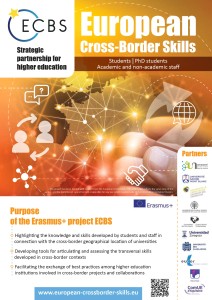The ECBS project
The European Cross-Border Skills (ECBS) project is a strategic partnership for higher education funded with support from the European Commission through the Erasmus+ programme over a period of three years (2017-2020).
Members of the project
The ECBS project is coordinated by the Université de Pau et des Pays de l'Adour.
The ECBS project brings together nine partners from five European countries. Among them, there are eight academic partners, each one corresponding to a higher education institution from four cross-border areas around France:
- the Franco-Spanish border with the Université de Pau et des Pays de l’Adour, the Universidad de Zaragoza and the Universidad del País Vasco/Euskal Herriko Unibertsitatea;
- the Franco-Italian border with the Université Savoie Mont Blanc and the Università della Valle d'Aosta;
- the Franco-German border: Eucor-The European Campus;
- the Franco-German-Luxembourgish-Belgian border with the Université de la Grande Région and the Universität des Saarlandes;
As a ninth partner, the ECBS project also includes Prof en Poche, a company specialized in AI-empowered tutoring solutions.
The project has also received support from the Communauté d’Universités et d’établissements d’Aquitaine as an associated partner of the project.
Purpose of the ECBS project
- Highlighting the knowledge and skills developed by students and staff in connection with the cross-border geographical location of universities;
- Developing tools for articulating and assessing the transversal skills developed in cross-border contexts;
- Facilitating the exchange of best practices among higher education institutions involved in cross-border projects and collaborations.
Target
The various tools developed in this project are tailored mainly for students (enrolled in a bachelor or a master's programme) and for PhD students. However, in the medium term, the project will concern all the academic community: students, faculty members, and also administrative staff.
Presentation of the ECBS Project

Presentation of the ECBS Project








